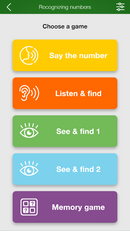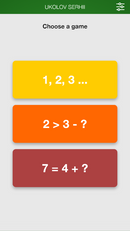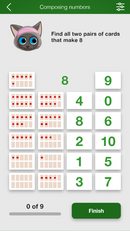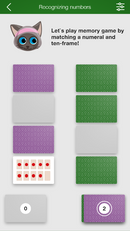Discover the fun visualization activities and games for building your child’s mental math muscle! Visual Math Karate contains 11 activities and games. The app is designed specifically to develop long-lasting fact fluency and “break” your child’s habit of over-relying on counting fingers.
How is this possible? We start with the use of ten frames to visualize numbers within 20 and continue with decomposing and composing numbers to find sums and differences to (finally!) releasing students from dependence on counting by ones.
Spanning from Pre-K to Grade 1, this unique method of counting, unitizing (or making groups of ten), adding and subtracting lays the foundation for understanding base-ten numbers and the place value system.
Through activities & games your child will learn a variety of strategies that will help her visualize, classify, compose, decompose, compare, add & subtract numbers. Acquiring these strategies are crucial for developing deep understanding of numbers, number sense, and the ability to fluently engage in all arithmetic operations.
Activities & Games:
- Recognizing numbers - 4 activities:
- Listen & find
- See & find (2 activities)
- Memory game
- Compare numbers – 3 activities:
- Ten frame vs. ten frame
- Ten frame vs. numeral
- Numeral vs. numeral
- Composing & decomposing (breaking) numbers – 4 activities:
- Ten frame vs. ten frame
- Ten frame vs. numeral
- Numeral vs. numeral
- Memory game
For Parents – Why Visual Math Karate?
A bit of research:You may not realize this, but children learn two types of numbers. Each type is useful for a different reason.
Ordinal numbers reflect the sequence of numbers (such as, counting numbers, 1, 2, 3, … 7, 8, 9). Numbers can also be used to indicate size or quantity. These are
cardinal numbers (such as, I see 5 cats and 3 more cats. There are 8 cats altogether.) Many researchers show that understanding cardinality helps children acquire good number sense. For this reason, Visual Math Karate emphasizes cardinality & visualization.
Research shows us that children who have learned to visualize ten frames can subitize (instantly recognize numbers). For example, look at our 8 ten frame. Children’s brains have learned to easily see a row of 5 and 3 more as 8. They see the 2 empty spaces, also. As such, children also will tell you that 8 is 2 dots away from 10 and that 8 and 2 make 10.
Memorization or Visualization? Memorizing facts is not even necessary!
Visualization helps children use strategies to do calculations mentally. Children enjoy using the ten frame and seeing how quickly their brains can do simple calculations.
The bottom line: When children have a visual image of numbers quantities 1-10 with ten-frames, it is easier to use mental math to calculate. Visualization and practice lead to mastery. Moreover, early strategy-based learning will help children think about multi-digit calculations. The same cannot be achieved through memorization with drills.
For Teachers – Why Visual Math Karate?
Have you ever been perplexed at how easily and quickly students appear to backslide and forget basic math facts, even after they have shown mastery on timed tests? Why do many continue to use their fingers and counting strategies to add and subtract well into second grade?
Visual Math Karate’ subitizing activities are designed to help young students readily identify the number of objects in a set without counting and develop the concept of cardinality. Cardinality is crucial for developing deep understanding of numbers, number sense, and the ability to fluently engage in arithmetic operations and comparisons.
Understanding of numbers as quantities will enable students to decompose and compose numbers, unitize, or make groups of ten, which is the foundation for understanding base-ten numbers and the place value system.















